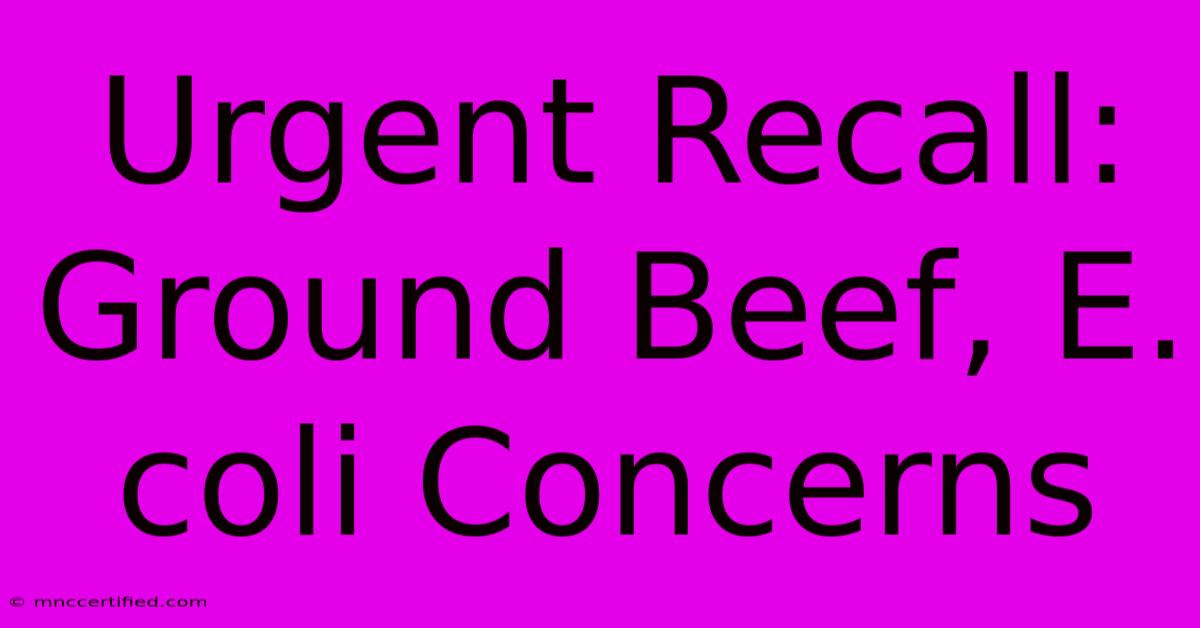Urgent Recall: Ground Beef, E. Coli Concerns

Table of Contents
Urgent Recall: Ground Beef Contaminated with E. coli - What You Need to Know
A major recall of ground beef products is underway due to potential E. coli contamination. This article provides crucial information to help you identify affected products and protect your family's health.
Understanding the E. coli Threat
Escherichia coli (E. coli) is a type of bacteria that can cause serious foodborne illness. While many strains are harmless, some, like Shiga toxin-producing E. coli (STEC), can lead to severe symptoms including:
- Diarrhea (often bloody): This is a primary symptom and can be severe.
- Stomach cramps: Intense abdominal pain is common.
- Vomiting: This can be a significant symptom, especially in the early stages.
- Fever: While not always present, a fever can indicate a more serious infection.
- Hemolytic Uremic Syndrome (HUS): In severe cases, E. coli infection can lead to HUS, a type of kidney failure. This is particularly dangerous for young children, the elderly, and individuals with weakened immune systems.
If you experience any of these symptoms after consuming ground beef, seek immediate medical attention.
Identifying Recalled Ground Beef Products
The recalled ground beef will be clearly identified by the USDA's Food Safety and Inspection Service (FSIS). Key information to look for includes:
- Brand Name: The specific brand of ground beef involved in the recall will be prominently stated in the recall announcement.
- Product Code: A unique product code or lot number will be assigned to the affected batches. This is crucial for identification.
- "Use By" or "Sell By" Date: Check the date printed on the packaging to determine if your ground beef is part of the recall.
- Establishment Number: This number, typically found on the package, identifies the processing plant.
Check the FSIS website () for the most up-to-date list of recalled products. The website will provide detailed information, including product photos and specific identification numbers. Pay close attention to the details – even seemingly minor differences in packaging or codes can make the difference.
What to Do if You Have Recalled Ground Beef
Do not consume the recalled ground beef. Even if it smells and looks fine, it could still be contaminated with E. coli. Here's what you should do:
- Locate the recalled product: Check your refrigerator and freezer for any ground beef that matches the description of the recalled products.
- Dispose of the product safely: Do not attempt to return it to the store. Wrap it securely in a plastic bag and discard it in your trash.
- Clean your surfaces: Thoroughly clean and disinfect any surfaces that may have come into contact with the recalled ground beef, including countertops, cutting boards, and utensils. Use hot, soapy water followed by a disinfectant.
- Wash your hands: Wash your hands thoroughly with soap and water for at least 20 seconds after handling the recalled product or cleaning contaminated surfaces.
Preventing Future Foodborne Illness
Food safety is paramount. Here are some tips to prevent future instances of E. coli contamination:
- Cook ground beef to a safe internal temperature: Use a food thermometer to ensure the ground beef reaches an internal temperature of 160°F (71°C).
- Wash your hands frequently: Wash your hands thoroughly before and after handling raw meat.
- Keep raw meat separate: Avoid cross-contamination by keeping raw meat separate from other foods.
- Refrigerate promptly: Refrigerate ground beef promptly after purchase.
- Don't let it sit out: Never leave cooked or uncooked ground beef at room temperature for more than two hours.
Stay Informed and Stay Safe
This situation highlights the importance of staying informed about food recalls. Regularly check the FSIS website and subscribe to their recall alerts to ensure you are always up-to-date on potential food safety hazards. Your health and the health of your family depend on it. Remember, when in doubt, throw it out!

Thank you for visiting our website wich cover about Urgent Recall: Ground Beef, E. Coli Concerns. We hope the information provided has been useful to you. Feel free to contact us if you have any questions or need further assistance. See you next time and dont miss to bookmark.
Featured Posts
-
Meet Celeb 2024 Contestant Coles
Nov 22, 2024
-
Arsenal Vs Juventus Womens Cl Live
Nov 22, 2024
-
Icc Powers Arresting Israeli Leaders
Nov 22, 2024
-
Electric Scooter Theft Insurance
Nov 22, 2024
-
Browns Upset Steelers In Snow Game
Nov 22, 2024